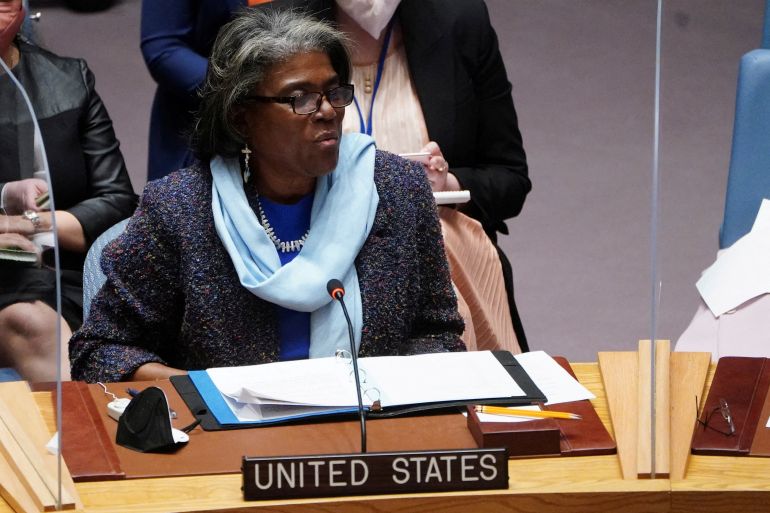US requests UN Security Council meeting on North Korea
Meeting, which diplomats say will take place Wednesday, comes after Pyongyang carried out 15th missile test this year.

The United States has requested a UN Security Council (UNSC) meeting later this week to discuss North Korea, diplomats said, as Washington is pushing the 15-member body to strengthen sanctions against Pyongyang.
Washington holds the UNSC presidency for the month of May and has been considering calling a meeting since late last week, the diplomats said on Monday.
Keep reading
list of 3 itemsKim renews call for N Korea military to ‘bolster their strength’
North Korea launches ballistic missile in 14th test this year
The public meeting is scheduled for Wednesday at 3pm local time in New York (19:00 GMT).
North Korea has ramped up its missile launches in recent months, holding 15 weapons tests so far this year in a show of force that has raised concerns from the country’s neighbours and the administration of US President Joe Biden.
The latest test was on Saturday, when Pyongyang fired a ballistic missile from a submarine.
The launch came just days before South Korean President-elect Yoon Suk-yeol, who has promised to take a hard line against North Korea, is set to be sworn in on Tuesday.
The US’s ambassador to the UN, Linda Thomas-Greenfield, said the country would like the Security Council to vote during May to further sanction North Korea. But China and Russia, which both hold veto power on the council, have signalled that they are opposed to further action.
“It is a challenge, it is a threat to international peace and security that the UN Security Council and its members have recognised in the past,” US Department of State spokesman Ned Price told reporters last week, about North Korea’s test launches.
“So we’re not going to get ahead of any steps that the UN might take or the UN Security Council might take, but we do think that accountability is important,” Price said.
“We do think it’s vital that the international community, our allies as well as partners around the world, send a very clear signal to [Pyongyang] that these types of provocations won’t be tolerated, they won’t improve its strategic positioning, and the world will respond accordingly.”
Another State Department official also said on May 6 that the US believes North Korea is “preparing its Punggye-ri test site and could be ready to conduct a test there as early as this month”.
North Korea has been subjected to UN sanctions since 2006, which the UNSC has steadily stepped up over the years in a bid to cut off funding for Pyongyang’s nuclear weapons and ballistic missile programmes.
Biden’s administration has been pushing the United Nations to take a tougher stance against North Korea over its recent missile launches, including its first intercontinental ballistic missile (ICBM) test since 2017, carried out in March.
Washington also has urged North Korea to return to denuclearisation talks, which have been stalled since a 2019 summit between North Korean leader Kim Jong Un and then-US President Donald Trump collapsed over Pyongyang’s demands for sanctions relief.
But North Korea so far has rebuffed overtures from the US, accusing Washington of maintaining hostile policies such as sanctions and military drills. Last month, Kim vowed to step up the development of banned nuclear weapons.
“We will continue to take steps to strengthen and develop our nation’s nuclear capabilities at the fastest pace,” Kim said, according to a transcript published by the official Korean Central News Agency.
The North’s nuclear weapons were “a symbol of national power” and should be diversified, he added.
Meanwhile, Biden is due to visit South Korea and Japan from May 20 to 24 – a visit that is expected to coincide with the formal launch of a new US economic plan in the region, known as the Indo-Pacific Economic Framework (IPEF), Tokyo’s ambassador to the US said on Monday.
Koji Tomita told a virtual event hosted by Washington’s Center for Strategic and International Studies that Japan and the US had been working on the details of the plan, which, he said, needed to strike a balance between inclusivity and high standards.
Asian countries are keen to boost ties with the US, but have been frustrated by its delay in detailing plans for economic engagement with the region since Trump quit a regional trade pact in 2017.
A South Korean government official said on Monday that the country is “positively considering” joining IPEF.
“It is listed in 110 national tasks that the incoming government is positively considering,” said a finance ministry official, speaking on condition of anonymity in line with government practice.